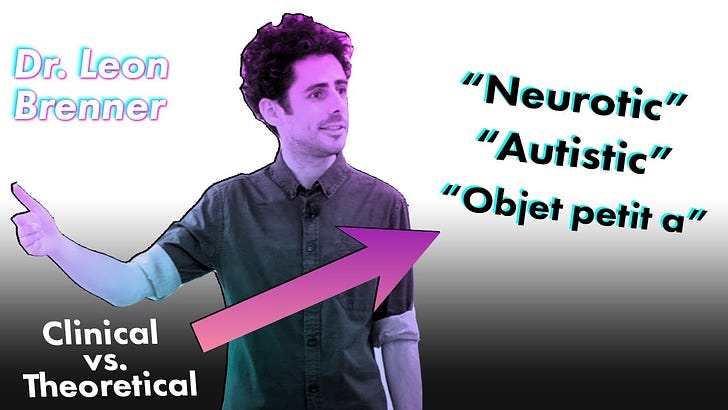Clinical psychoanalysis vs. the Ljubljana school of psychoanalysis - A lesson from Dr. Leon Brenner
Words for psychoanalytic practice have a different meaning when used outside of the clinic!
Guys like me or Mikey (Michael Downs at The Dangerous Maybe) have gotten a lot of mileage thinking with Lacanian concepts outside of the clinic. This is largely due to the influence of the Ljubljana School of Psychoanalysis, which has, thanks to our friend Slavoj Žižek, popularized the the usage of Lacanian concepts for thinking about politics, philosophy, and art.
Indeed, it is hard to think about philosophy without reference to the “Borromean Knot” of the imaginary, symbolic, and real, which has at its center this thing we call “reality.” While the “real” is not Kant’s noumenal realm, every philosopher is forced to think through the difference. Likewise, reading chapter six of Being and Time last year, I had to keep wondering to what degree Lacan might have been inspired by the way Heidegger uses his conception of reality to bracket out classic conundrums such as “realism" vs. “idealism” or the divide between subject and object.
It has likewise become hard to think about human subjectivity, much less my own direct experience and habits, without recourse to the distinction between pleasure and enjoyment (jouissance) and, ultimately, death drive. For people like us, capital critique can no longer merely focus on the fetishization of commodities, labor exploitation, or the destruction of the planet. With works like Capitalism and Desire, we now cannot think critique of political economy without also factoring in libidinal economy.
Thanks to the work of Žižek, Zupančič, Dolar, and so many others at the Ljubljana school, we have witnessed the rise of cultural analysts such as Todd McGowan, Russ Sbriglia, and Duane Rousselle, among so many others, who “apply psychoanalysis” to cultural topics. McGowan, more than anyone perhaps, has made some of the crucial innovations of Žižek’s work more accessible than ever with his (relatively) popular podcast Why Theory, with co-host Ryan Engley! We owe an astounding debt to their work.
There is just one problem, according to Dr. Leon Brenner: The clinical concepts put to use in essays or seminars by Jacques Lacan were not made for doing philosophy, politics, or art. They are clinical in the sense that they relate to the setting of the clinic, full stop. This means they are ethical concepts, meant to orient the way that an analyst thinks about and works in the context of their practice.
Brenner is agnostic as to the extent that Lacanian concepts can be made fruitful use of outside of the clinic. For instance, in my most recent conversation with him, Brenner said he appreciates the work of the Ljubljana school, and speaks highly of McGowan’s most recent book The Racist Fantasy. The point is not to discourage the use of Lacanian concepts outside of their practical context, but to remind us, theorists, that just because the signifiers are the same does not mean their signifieds share the same meaning.
Put another way: Neurotics do not exist outside of the clinic. In the video clip above, Brenner turns right back around and says that of course Woody Allen is, for instance, the classic example of a “neurotic,” but this signifier is now serving a different purpose than it does in the clinic. Within the context of the clinic the neurotic is not some ontological reality, nor the identity of the analysand. Rather, in this context, “neurotic” serves as a practical indication of how the analyst is to orient activities within the relationship between analyst and analysand.
Dr. Leon Brenner is the author of The Autistic Subject: On the Threshold of Language. He is teaching an introductory course to thinking about the clinical structures of psychoanalysis in Freud and Lacan at Theory Underground. This course begins February 28th, 2024, and goes for four weeks, ending on March 20th.
For those who are, like me, seeking to use terms such as “neurotic, psychotic, pervert,” or “autistic” outside of the clinical context, it will help us appear a little less foolish, and perhaps even refine our understanding, if we first can grasp the sense, purpose, and context from which these structures arose—in the clinic!
The early bird sale for this course has begun now and goes for another week only! Use the coupon code #Brenner1Substack to get 25% off of of the course tiers (1-4). Use the coupon code and enroll here.
Alternatively, you can save a lot and access all past, ongoing, and upcoming courses at TU by becoming a monthly subscriber at tiers 3 or 4 via the app or from the site store!





